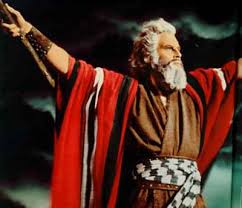
I AM A GOLDEN GOD!
According to some theology scholars, there is evidence that God had a wife named Asherah in the Old Testament. Asherah, the fertility Goddess, and God were apparently worshiped as a pair. As the religion evolved (as they tend to do), scholars argue that the increasingly paternal characterization of God along with a movement towards transcendental monotheism led to the Goddess’ demise. Is this really all that surprising? For any of you that has spent a considerable amount of time learning about the Old Testament, you know that it chronicles a long history from Adam, to Abraham, from the exodus to the exile, and from David to the Diaspora. Is it surprising to anybody that as time passed, the people’s understanding of God and their religious practices changed? It has always been about the synthesis of people and their ideas. Monotheism was likely adopted by the ancient Hebrews after they came in contact with the Zoroastrians. If this is true, does it make the Old Testament a sham? Absolutely not.
It is human tendency to become fixated on the words of the parable instead of the understanding behind it. In ancient times, people understood religion only when explanations were tied to everyday experience. Perhaps the ancient Hebrews needed a more personal explanation of their religion before advances in intellectualism allowed for a more nuanced oneness of God. Hindus, for example, have many deities. But in Hinduism, it is the ultimate oneness, the monism, that any Hindu scholar will tell you to focus on. To add a Muslim twist on the eternity of heaven, wouldn’t it be easier for a man to understand that it’s like having 72 virgins jockin’ you (but even better than that)?
In the Christian faith, during the time of Constantine, the First Council of Nicaea was formed more than 300 years after Jesus’ death to put together a new testament and establish a more formalized religion. Up until that point, Christianity was basically a rallying cry of good news and a way for the underclass to organize and rise up against their oppressors. Until Constantine “found God,” the Gospels weren’t universalized and they certainly weren’t uniform.
So after all these advances were made and after Christianity rose up and usurped power from the Roman Empire, Islam came along (7th Century anno domini). Muslims believe that the only true miracle during the time of the Prophet was the revelation of the Qur’an to him by God (via Archangel Gabriel). So right off the bat, an oral tradition was born where the followers of the Prophet would memorize the revelations. This practice was very sacred. Muslims believed that the other religious texts that came before it (via the long line of prophets in Judaism and Christianity) were corrupted via poor preservation and the influence of man. Considering that scholars now believe God’s wife was edited out of the Old Testament, is this such a ridiculous tactic?
About 40 years after the Prophet died, the memorized verses were put on to paper. Since that point, historians have verified that the Qur’an is still in the exact form from that time. It should come as no surprise that the purity of the Qur’an’s verses are very important to Muslism.
So… Here comes the tricky part in explaining things to cherry-pickers who like to focus only on the warring parts of the Qur’an…
It’s all about context. How do we validate the discrepancies between God’s laws in the Old Testament from the laws that govern us in the United States? For the quick-to-judge Islam crowd, ask yourself, why is that question so simple and why is balancing the Qur’an and modern law so difficult?
Tides change. When Christendom couldn’t find its way out of a paper bag during the dark ages, Islamic philosophy, arts, culture, and technology were flourishing. Through the cultural exchanges via trading and the Crusades (along with establishing a foothold on the Iberian peninsula), the torch of advancement was passed along to Europe (yes both by war and peace… it’s a real world with real histories). As Europe peaked upward, the Muslim empires that encompassed many lands, people, and cultures started to splinter and decline. After much of the Muslim world was conquered via colonialism, we’ve finally reached a point where the influence of Islam is at a crucial juncture. But as Christendom and multiculturalism progressed into western-style democracy, it now carries the torch…
So perhaps the discrepancies between the Qur’an as the literal word of God and American notions of Freedom and democracy aren’t all that incompatible after all. The torch of human progress just hasn’t illuminated the pages. Unfortunately, I fear that impatience on the part of the beholders might lead to conflagration instead of synthesis.
Tags: Islam, islamophobia, Koran, Old Testament, Qur'an, Sharia

